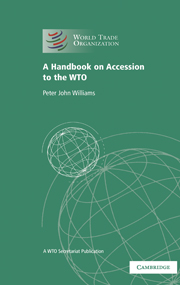Book contents
- Frontmatter
- Contents
- List of boxes and tables
- Foreword
- List of abbreviations and acronyms
- Introduction and summary
- Chapter 1 Accession in perspective
- Chapter 2 The basic rules
- Chapter 3 Technical assistance and training for acceding countries
- Chapter 4 The accession process: the procedures and how they have been applied
- Chapter 5 Substance of accession negotiations
- ANNEXES
Chapter 5 - Substance of accession negotiations
Published online by Cambridge University Press: 05 March 2012
- Frontmatter
- Contents
- List of boxes and tables
- Foreword
- List of abbreviations and acronyms
- Introduction and summary
- Chapter 1 Accession in perspective
- Chapter 2 The basic rules
- Chapter 3 Technical assistance and training for acceding countries
- Chapter 4 The accession process: the procedures and how they have been applied
- Chapter 5 Substance of accession negotiations
- ANNEXES
Summary
The aim of this Part is to review the terms on which applicants have acceded to the WTO. The WTO Agreement simply provides that a State or separate customs territory possessing full autonomy in the conduct of its external commercial relations and of the other matters provided for in this Agreement and the Multilateral Trade Agreements may accede “on terms to be agreed between it and the WTO”. The terms of accession are contained in the Protocols annexed to the Reports of accession Working Parties. The documents containing the text of the Reports are listed in Annex 5. Footnotes cite the new Members concerned. These are arranged in the reverse order of accession, i.e. they cite first the applicant to have acceded more recently. This method has been adopted because, on the whole, more recent accessions are a better guide to current practice than earlier accessions. The footnotes also refer to the relevant paragraphs in these Reports and the annexed accession Protocols.
WTO Members each have different obligations. Article XII does not explain the terms on which applicants may be invited to accede. One reason for its lack of specificity is that the terms of accession are different in each case also because each acceding government negotiates its own unique concessions on customs duties, commitments on agricultural support and export subsidies and specific commitments on its services regime on the basis of its national measures.
- Type
- Chapter
- Information
- A Handbook on Accession to the WTOA WTO Secretariat Publication, pp. 48 - 130Publisher: Cambridge University PressPrint publication year: 2008



